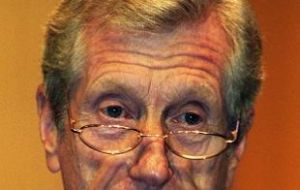MercoPress. South Atlantic News Agency
Sir Alan Walters, Prime Minister Margaret Thatcher's personal economic advisor, dies aged 82
 Sir Alan Walters: Prime Minister Thatcher's 'economic guru'
Sir Alan Walters: Prime Minister Thatcher's 'economic guru' Professor Sir Alan Walters, former personal economic advisor to Prime Minister Margaret Thatcher, and credited with being an architect of the 1980's renaissance of the economy of the United Kingdom, died peacefully at home on Saturday at the age of 82.
Lady Thatcher appreciated Sir Alan's robust approach to economics, his forthright manner, and his ability to fight to present his own strong points of view. Their relationship was based on mutual trust and respect. A statement from Lady Thatcher read, "Alan Walters was the best economic adviser any prime minister ever had - radical, fearless, consistent and creative." He was a great public servant and to me personally he was the finest of friends." Sir Alan was one of the foremost economists of his generation. His road to Downing Street began at his birth in Leicester, England in 1926. After a period of military service he obtained a Bachelors Degree at the University of Birmingham, and quickly established a reputation for independent thinking and originality of ideas. As Professor of Economics at the University of Birmingham he soon became an advocate of Britain maintaining strict monetary targets without the money supply being manipulated for political reasons. He became Professor of Economics at The London School of Economics between 1967 and 1976, one of its most radical periods. He had argued from as early as the 1960's that the United Kingdom should keep to strict monetary targets and that policymakers would have to keep a much stricter control on the total amount of money circulating in the economy if they wanted to curb inflation. It was a view that became fashionable on the Right during the steep inflation of the 1970's, during which time he developed close ties with Tory frontbenchers. In 1981, Prime Minister Thatcher asked him to leave his job as a professor at the John Hopkins University in Baltimore to become her personal economics adviser. Along with Sir Geoffrey Howe, the Chancellor of the Exchequer, Sir Alan persuaded Lady Thatcher to take one of her biggest gambles with the 1981 Budget, which overturned Keynesian orthodoxy by raising taxes in the middle of a severe recession. More than 350 leading economists wrote to The Times of London questioning the Government's policies after the Budget speech. "The time has come to reject monetarist policies," they declared, but in the event, the 1981 Budget was credited with laying the path for the sustained economic growth of the 1990s. Sir Alan received a knighthood, and in 1983 returned to the United States as economic adviser to the World Bank. He continued advising Lady Thatcher on an informal basis and then in May 1989, returned on a full-time basis. After just five months he clashed with the then Chancellor of the Exchequer, Nigel Lawson. Mr Lawson was infuriated when Sir Alan was quoted, (from a commentary written before his return to Downing Street), as calling the Exchange Rate Mechanism "half-baked." This event produced one of Lady Thatcher's most memorable quotes, when she was asked by Neil Kinnock, (the Opposition Leader), at Prime Minister's Question Time whether she was going to get rid of her part-time Chancellor. "Advisers advise, ministers decide," she replied. After six years in the job, Mr Lawson walked out, and Sir Alan submitted his resignation some hours later by telephone from his home in Washington. He became Vice-Chairman of AIG Trading, the trading and market-making arm of the US insurance giant. Sir Alan continued to be a major voice in economic affairs, and remained in the news for his opposition to the "consensus" politics of Prime Minister John Major, (Lady Thatcher's successor), and to the creation of the single European currency. In 1997 he was a parliamentary candidate for Sir James Goldsmith's Referendum party. He leaves behind a wife, Lady Margaret Patricia Walters, known as Paddie, and a daughter by a previous marriage, Louise. Lady Walters was a devoted wife and was at his side until the very end. She stated, "Alan was the kindest and most loving person and I loved him very, very much but his quality of life during the recent few months, had not been good. So it is for the best." On a personal note, I will miss Alan, not only for honoring me with his friendship, but also for his sound advice over many years, and in particular, for encouraging me to state what I thought about certain economic and financial sector issues, notwithstanding that some of my statements were considered confrontational and others, contrarian. Alan always said, "You must have the courage of your convictions even if it subjects you to unpopularity in certain sectors ... and more so when you are proven correct!" David Michaels - New York MercoPress Bureau Chief First Vice President, Foreign Press Association




Top Comments
Disclaimer & comment rulesCommenting for this story is now closed.
If you have a Facebook account, become a fan and comment on our Facebook Page!